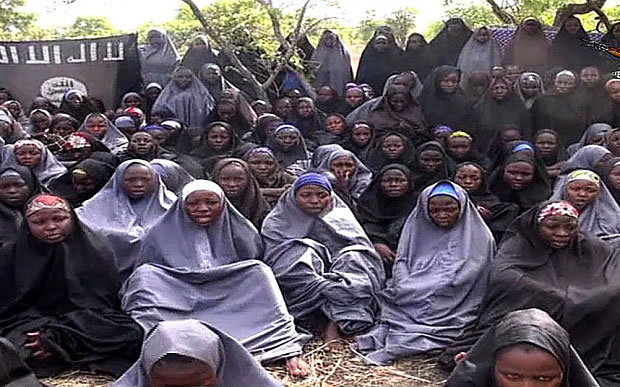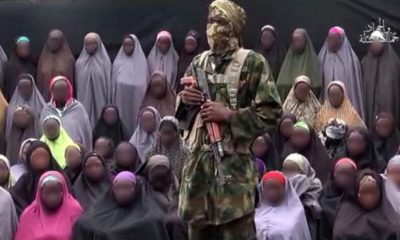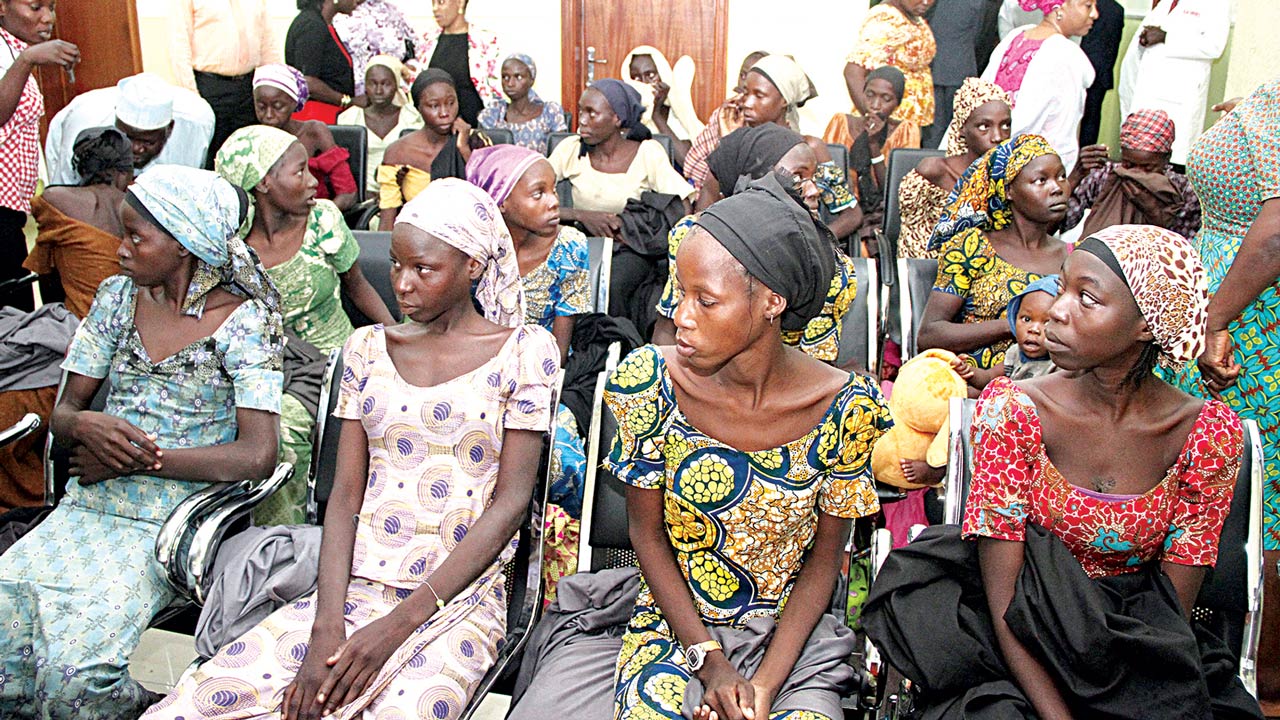Feature/OPED
Chibok Girls—Long Forgotten?

By Prince Charles Dickson PhD
All idiots are morons, but not all morons are idiots
On the night of 14–15 April 2014, 276 mostly Christian female students aged from 16 to 18 were kidnapped by the Islamic terrorist group Boko Haram from the Government Girls Secondary School in the sleepy town of Chibok in Borno State, Nigeria.
To date, Chibok itself has witnessed almost a dozen more attacks. Chibok, since Chibok, has seen almost one attack per year, per village after that incident, whether it is Kwarangullum, Piyemi, Kauitkari, Pemi, villages, it is tales of woes and neglect.
Eight years and counting, 110 of them are still missing and more than half that ML number will never be found. And in this timeline, over 1500 children, according to Amnesty International, have been abducted, and UNICEF figures state over one million children are afraid to go back to school as a result of violence.
The Chibok girls have now become a symbol of the nation and her wayward ways. Chibok, a community discussed as an ethnic, faith-based, party-based, politics laced, hate coloured discussion. It symbolizes everything that we stand for in many ways.
Chibok has no electricity, no good roads, and health is on leave of absence; the only bank for a long time was simply an agency. Chibok had only that secondary school. Chibok is Nigeria, and Nigeria is Chibok.
I have done a sizable amount of work on not just Boko Haram but also the Chibok girls, killings, abductions and Nigeria’s conflict-torn Northwest region. I have visited Chibok four times, I have spoken to a few of the girls that were released, spoke to one that escaped, I have spoken with several of the parents, and that includes a few that are now dead.
For the purpose of this admonition, let me quickly share what I would like to call some quick facts of the matter as it is and reminders. I do not expect it to go down well with many, but truth be told, what’s the essence of an opinion if it is tailored to go down with everyone?
Some of those quick facts include but are not limited to the following–Those girls were indeed abducted from the Government Secondary School in Chibok and although the figures are conflicting, it is even safe to conclude that no one knows the exact number of girls abducted not even the government, even Boko Haram has lost count of their damage. After years of pressure, there is a semblance of a list of Missing Persons but it’s not even accessible and very conflicting.
Before Chibok, Boko Haram had established a tradition of abducting girls and women, for countless reasons, the authorities were quiet, the media reported a few it could, and let me tell us many parents equally kept quiet and took it all in their stride.
This writer had interviewed several girls and women who were victims; they escaped one way or the other.
I equally know that for a fact, many believe that Mr Muhammadu Buhari and the ‘North’ however defined was and is Boko Haram and that with Buhari as president, the girls would have been found. And many still don’t understand the whole Dapchi Episode and Leah that was left behind.
It certainly is not a Peoples Democratic Party (PDP) or All Peoples Congress (APC) stratagem and now with Patience Jonathan almost forgotten for that popular “Derris God” rant, what will only be remembered of her hubby, is his failure as charge de affaire of government when it happened, while late Sani Abacha is credited to have propounded that theory of “if killings go on for so, so and so time, the government knows about it, or are behind it.”
Recall the drama of what I call the international week of Boko Haram—the week where the United States, UK, France, China, and Togo, were all willing to help, and how the drones were droning. Nothing happened!
I recall the dramatic Chadian negotiation, a ballet between Modu Sherif, Idris Derby and Jonathan, the total of which revealed that we are not really serious as a people on matters that we should be serious about. And that many of our tales of nationhood are Chibok like…
The cruel fact is that several hundreds of girls that are victims of this terrible group have paid the ultimate price, a few have escaped with almost irreparable damage, others have become part of them, and we have not done much.
It is equally a fact that one of the many reasons that Boko Haram may continue for a while is because many still do not know what the group is all about, does it has an ideology, what really is it about…a CIA conspiracy or a thing about poverty, how is it connected to ISWAP, are the same and one with the current bandits and terror camps of abductors that have gradually filtered in numbers into other parts of the north. How about their funding, communication and many such questions?
I also know that based on what is out there, many experts on the subject matter are foreigners and one wonders, but Salkida, and a few who by the mention of our names do more harm than good. I do not always believe former Olusegun Obasanjo, but I agree with him when he asserts, “many, most, half of these girls will never come back…” That is a fact! A sizable number have passed on, sadly so! And yes, did I add Salkida also affirmed, and I concur too. But the good Lord bless those of us that have remained dedicated to the cause–true men and women!
The Chibok parents continue grieving and mourning, with irreparable bewilderment and pain, as they do not know the exact situation of their wards. There may never be any closure, and that fact is gruesomely scary.
Eight years, we have lost men and officers, more villagers and villages have been killed and taken, loads of propaganda, half-truths, misinformation and sheer falsehoods, fight between now opposition PDP, and governing APC, even the Air Force has accused the Army of taking their shine. The army has had a mutinous situation, local media vs. foreign media, and Christians/Muslims. But the fact is that we do not have the Chibok girls.
The Boko Haram group in all its splinters, continue making all sorts of demands, releasing videos, and creating more confusion, but the fact is that some girls just disappeared. They were abducted because our institutions are not working the way they should, the girls will/may not be found because we are not sincere people, because many of them are dead, and because we are largely and easily divided by our selfish motives.
This administration would have spent eight years unable to fulfil this promise of safety, and security, simply blaming everyone but themselves, assuring themselves while no one is safe, and it would be symptomatic of who we are as a people. The Chibok saga will continue to remind us of who we really are, till we are ready, like Leah and our baby failed constructs, we will remain hunted and haunted for failing these girls till we hear the real story, the true story—only time will tell.
Feature/OPED
Brent’s Jump Collides with CBN Easing, Exposes Policy-lag Arbitrage

Nigeria is entering a timing-sensitive macro set-up as the oil complex reprices disruption risk and the US dollar firms. Brent moved violently this week, settling at $77.74 on 02 March, up 6.68% on the day, after trading as high as $82.37 before settling around $78.07 on 3 March. For Nigeria, the immediate hook is the overlap with domestic policy: the Central Bank of Nigeria (CBN) has just cut its Monetary Policy Rate (MPR) by 50 basis points to 26.50%, whilst headline inflation is still 15.10% year on year in January.
“Investors often talk about Nigeria as an oil story, but the market response is frequently a timing story,” said David Barrett, Chief Executive Officer, EBC Financial Group (UK) Ltd. “When the pass-through clock runs ahead of the policy clock, inflation risk, and United States Dollar (USD) demand can show up before any oil benefit is felt in day-to-day liquidity.”
Policy and Pricing Regime Shift: One Shock, Different Clocks
EBC Financial Group (“EBC”) frames Nigeria’s current set-up as “policy-lag arbitrage”: the same external energy shock can hit domestic costs, FX liquidity, and monetary transmission on different timelines. A risk premium that begins in crude can quickly show up in delivered costs through freight and insurance, and EBC notes that downstream pressure has been visible in refined markets, with jet fuel and diesel cash premiums hitting multi-year highs.
Market Impact: Oil Support is Conditional, Pass-through is Not
EBC points out that higher crude is not automatically supportive of the naira in the short run because “oil buffer” depends on how quickly external receipts translate into market-clearing USD liquidity. Recent price action illustrates the sensitivity: the naira was quoted at 1,344 per dollar on the official market on 19 February, compared with 1,357 a week earlier, whilst street trading was cited around 1,385.
At the same time, Nigeria’s inflation channel can move quickly even during disinflation: headline inflation eased to 15.10% in January from 15.15% in December, and food inflation slowed to 8.89% from 10.84%, but energy-led transport and logistics costs can reintroduce pressure if the risk premium persists. EBC also points to a broader Nigeria-specific reality: the economy grew 4.07% year on year in 4Q25, with the oil sector expanding 6.79% and non-oil 3.99%, whilst average daily oil production slipped to 1.58 million bpd from 1.64 million bpd in 3Q25. That mix supports external-balance potential, but it also underscores why the domestic liquidity benefit can arrive with a lag.
Nigeria’s Buffer Looks Stronger, but It Does Not Eliminate Sequencing Risk
EBC sees that near-term external resilience is improving. The CBN Governor said gross external reserves rose to USD 50.45 billion as of 16 February 2026, equivalent to 9.68 months of import cover for goods and services. Even so, EBC views the market’s focus as pragmatic: in a risk-off tape, investors tend to price the order of transmission, not the eventual balance-of-payments benefit.
In the near term, EBC expects attention to rotate to scheduled energy and policy signposts that can confirm whether the current repricing is a short, violent adjustment or a more durable regime shift, including the U.S. Energy Information Administration (EIA) Short-Term Energy Outlook (10 March 2026), OPEC’s Monthly Oil Market Report (11 March 2026), and the U.S. Federal Reserve meeting (17 to 18 March 2026). On the domestic calendar, the CBN’s published schedule points to the next Monetary Policy Committee meeting on 19 to 20 May 2026.
Risk Frame: The Market Prices the Lag, Not the Headline
EBC cautions that outcomes are asymmetric. A rapid de-escalation could compress the crude risk premium quickly, but once freight, insurance, and hedging behaviour adjust, second-round effects can linger through inflation uncertainty and a more persistent USD bid.
“Oil can act as a shock absorber for Nigeria, but only when the liquidity channel is working,” Barrett added. “If USD conditions tighten first and domestic pass-through accelerates, the market prices the lag, not the headline oil price.”
Brent remains an anchor instrument for tracking this timing risk because it links energy-led inflation expectations, USD liquidity, and emerging-market risk appetite in one market. EBC Commodities offering provides access to Brent Crude Spot (XBRUSD) via its trading platform for following energy-driven macro volatility through a single instrument.
Feature/OPED
Gen Alpha: Africa’s Digital Architects, Not Your Target Audience

By Emma Kendrick Cox
This year, the eldest Gen Alpha turns 16.
That means they aren’t just the future of our work anymore. They are officially calling for a seat at the table, and they’ve brought their own chairs. And if you’re still calling this generation born between 2010 and 2025 the iPad generation, then I hate to break it to you, but you’re already obsolete. To the uninitiated, they look like a screen-addicted mystery. To those of us paying attention, they are the most sophisticated, commercially potent, and culturally fluent architects Africa has ever seen.
Why? Because Alphas were not born alongside the internet. They were born inside it. And by 2030, Africa will be home to one in every three Gen Alphas on the planet.
QWERTY the Dinosaur
We are witnessing the rise of a generation that writes via Siri and speech-to-text before they can even hold a pencil. With 63% of these kids navigating smartphones by age five, they don’t see a QWERTY keyboard as a tool. They see it as a speed bump, the long route, an inefficient use of their bandwidth. They don’t need to learn how to use tech because they were born with the ability to command their entire environment with a voice note or a swipe.
They are platform agnostic by instinct. They don’t see boundaries between devices. They’ll migrate from an Android phone to a Smart TV to an iPhone without breaking their stride. To them, the hardware is invisible…it’s the experience that matters.
They recognise brand identities long before they know the alphabet. I share a home with a peak Gen Alpha, age six and a half (don’t I dare forget that half). When she hears the ding-ding-ding-ding-ding of South Africa’s largest bank, Capitec’s POS machine, she calls it out instantly: “Mum! Someone just paid with Capitec!” It suddenly gives a whole new meaning to the theory of brand recall, in a case like this, extending it into a mental map of the financial world drawn long before Grade 2.
And it ultimately lands on this: This generation doesn’t want to just view your brand from behind a glass screen. They want to touch it, hear it, inhabit it, and remix it. If they can’t live inside your world, you’re literally just static.
The Uno Reverse card
Unlike any generation we’ve seen to date, households from Lagos to Joburg and beyond now see Alphas hold the ultimate Uno Reverse card on purchasing power. With 80% of parents admitting their kids dictate what the family buys, these Alphas are the unofficial CTOs and Procurement Officers of the home:
-
The hardware veto: Parents pay the bill, but Alphas pick the ISP based on Roblox latency and YouTube 4K buffers.
-
The Urban/Rural bridge: In the cities, they’re barking orders at Alexa. In rural areas, they are the ones translating tech for their families and narrowing the digital divide from the inside out.
-
The death of passive: I’ll fall on my sword when I say that with this generation, the word consumer is dead. It implies they just sit there and take what you give them, when, on the contrary, it is the total opposite. Alphas are Architectural. They are not going to buy your product unless they can co-author the experience from end to end.
As this generation creeps closer and closer to our bullseye, the team here at Irvine Partners has stopped looking at Gen Alpha as a demographic and started seeing them as the new infrastructure of the African market. They are mega-precise, fast, and surgically informed.
Believe me when I say they’ve already moved into your industry and started knocking down the walls. The only question is: are you building something they actually want to live in, or are you just a FaceTime call they are about to decline?
Pay attention. Big moves are coming. The architects are here.
Emma Kendrick Cox is an Executive Creative Director at Irvine Partners
Feature/OPED
Why Digital Trust Matters: Secure, Responsible AI for African SMEs?

By Kehinde Ogundare
For years, security for SMEs across sub-Saharan Africa meant metal grilles and alarm systems. Today, the most significant risks are invisible and growing faster than most businesses realise.
Artificial Intelligence has quietly embedded itself into everyday operations. The chatbot responding to customers at midnight, the system forecasting inventory requirements, and the software identifying unusual transactions are no longer experimental technologies. They are becoming standard features of modern business tools.
Last month’s observance of Safer Internet Day on February 10, themed ‘Smart tech, safe choices’, marked a pivotal moment. As AI adoption accelerates, the conversation must shift from whether businesses should use AI to how they deploy it responsibly. For SMEs across Africa, digital trust is no longer a technical consideration. It is a strategic business imperative.
The evolving threat landscape
Cybersecurity threats facing sub-Saharan African SMEs have moved well beyond basic phishing emails. Globally, cybercrime costs are projected to reach $10.5 trillion this year, fuelled by generative AI and increasingly sophisticated social engineering techniques. Ransomware attacks now paralyse entire operations, while other threats quietly extract sensitive customer data over extended periods.
The regional impact is equally significant. More than 70% of South African SMEs report experiencing at least one attempted cyberattack, and Nigeria faces an average of 3,759 cyberattacks per week on its businesses. Kenya recorded 2.54 billion cyber threat incidents in the first quarter of 2025 alone, whilst Africa loses approximately 10% of its GDP to cyberattacks annually.
The hidden risk of fragmentation
A common but often overlooked vulnerability lies in digital fragmentation.
In the early stages of growth, SMEs understandably prioritise affordability and agility. Over time, this can result in a patchwork of disconnected applications, each with separate logins, security standards, and privacy policies. What begins as flexibility can involve operational complexity.
According to IBM Security’s Cost of a Data Breach Report, companies with highly fragmented security environments experienced average breach costs of $4.88 million in 2024.
Fragmented systems create blind spots; each additional data transfer between applications increases exposure. Inconsistent security protocols make governance harder to enforce. Limited visibility reduces the ability to detect anomalies early. In practical terms, complexity increases risk.
Privacy-first AI as a competitive differentiator
As AI capabilities become embedded in business software, SMEs face a choice about how they approach these powerful tools. The risks are not merely theoretical.
Consumers across Africa are becoming more aware of data rights and are willing to walk away from businesses that cannot demonstrate trustworthiness. According to KPMG’s Trust in AI report, approximately 70% of adults do not trust companies to use AI responsibly, and 81% expect misuse. Meanwhile, studies also show that 71% of consumers would stop doing business with a company that mishandles information.
Trust, once lost, is difficult to rebuild. In the digital age, a single data leak can destroy a reputation that took ten years to build. When customers share their payment details or purchase history, they extend trust. How you handle that trust, particularly when AI processes their data, determines whether they return or take their business elsewhere.
Privacy-first, responsible AI design means building intelligence into business systems with data protection, transparency and ethical use embedded from the outset. It involves collecting only necessary information, storing it securely, being transparent about how AI makes decisions, and ensuring algorithms work without compromising customer privacy. For SMEs, this might mean choosing inventory software where predictive AI runs on your own data without sending it externally, or customer service platforms that analyse patterns without exposing individual records. When AI is built responsibly into unified platforms, it becomes a competitive advantage: you gain operational efficiency whilst demonstrating that customer data is protected, not exploited.
Unified platforms and operational resilience
The solution lies in rethinking digital infrastructure. Rather than accumulating disparate tools, businesses need unified platforms that integrate core functions whilst maintaining consistent security protocols.
A unified approach means choosing cloud-based platforms where functions share common security standards, and data flows seamlessly. For a manufacturing SME, this means inventory management, order processing and financial reporting operate within a single security framework.
When everything operates cohesively, security gaps diminish, and the attack surface shrinks. And the benefits extend beyond risk reduction: employees spend less time on administrative friction, customer data stays consistent, and platforms enable secure collaboration without traditional infrastructure costs.
Safer Internet Day reminds us that the digital world requires active stewardship. For SMEs across the African continent who are navigating complex threats whilst harnessing AI’s potential, digital trust is foundational to sustainable growth. Security, privacy and responsible AI are essential characteristics of any technology infrastructure worth building upon. Businesses that embrace unified, privacy-first platforms will be more resilient against cyber threats and better positioned to earn and maintain trust. In a market where trust is currency, that advantage is everything.
Kehinde Ogundare is the Country Head for Zoho Nigeria
-

 Feature/OPED6 years ago
Feature/OPED6 years agoDavos was Different this year
-
Travel/Tourism10 years ago
Lagos Seals Western Lodge Hotel In Ikorodu
-

 Showbiz3 years ago
Showbiz3 years agoEstranged Lover Releases Videos of Empress Njamah Bathing
-

 Banking8 years ago
Banking8 years agoSort Codes of GTBank Branches in Nigeria
-

 Economy3 years ago
Economy3 years agoSubsidy Removal: CNG at N130 Per Litre Cheaper Than Petrol—IPMAN
-

 Banking3 years ago
Banking3 years agoSort Codes of UBA Branches in Nigeria
-

 Banking3 years ago
Banking3 years agoFirst Bank Announces Planned Downtime
-

 Sports3 years ago
Sports3 years agoHighest Paid Nigerian Footballer – How Much Do Nigerian Footballers Earn















